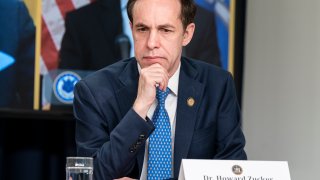
What to Know
- New York’s health agency is walking back a recent statement by the state’s top health official, who had cast doubt on reports from nurses about dire shortages of protective gear at the height of the COVID-19 pandemic
- The state is now requiring hospitals — who are offering elective surgeries again — to have a 90-day supply of protective gear on hand
- New York State Public Employees Federation President Wayne Spence called on Gov. Andrew Cuomo’s administration to clarify whether new 90-day supply requirements are based on how much gear hospitals went through during the pandemic, or manufacturer guidance for single-use N-95 masks
New York’s health agency is walking back a recent statement by the state’s top health official, who had cast doubt on reports from nurses about dire shortages of protective gear at the height of the COVID-19 pandemic in late March and early April.
State health commissioner Howard Zucker said this week that he spoke to hospital administrators, nurses and physicians amid the pandemic, and said he was told “they have the PPE,” referring to personal protective equipment.
“Just because something is reported doesn’t mean those are the facts of what is actually happening,” Zucker said at a Wednesday legislative hearing.
Get Tri-state area news and weather forecasts to your inbox. Sign up for NBC New York newsletters.
“I can tell you that in those conversations with those physicians and those nurses, they said: ‘We have the PPE,'" Zucker said. "'That is, if there was a problem, they should come back to us. We make sure that it’s available.’”
But health department spokesperson Jill Montag said in a statement on Thursday that state health officials had indeed heard reports from nurses demanding more or better protective gear. And New York is now requiring hospitals — who are offering elective surgeries again — to have a 90-day supply of protective gear on hand, while Gov. Andrew Cuomo has called for local supply chains so New York doesn’t have to rely on out-of-state sources again.
“When we heard from nurses on the ground that they needed more or better PPE, we immediately started daily conversations with union representatives, tightened protocols and treated the situation with the urgency it deserved to help ensure our frontline responders had necessary PPE,” Montag said.
Montag said new regulations and local supply chains would “prevent this from ever happening again.”
Still, Zucker’s comments drew criticism from several lawmakers and union representatives, who criticized shifting and inadequate federal and state emergency guidelines amid the pandemic.
Observers questioned whether Cuomo's administration is doing enough to ensure health care workers have access to enough and adequate gear in case of another wave.
“Many hospitals instituted policies that were worse than the guidelines and nurses were forced to provide care with a surgical mask or use n-95 masks for as long as a week,” Pat Kane, executive director of the statewide nurses association, which has sued in New York over a lack of protective gear amid the pandemic, said at a Thursday legislative hearing.
Kane said hospital management at times resorted “to unproven methods to sterilize N-95 masks.”
In an April 2 advisory about how health care facilities should handle supply shortages, state infectious disease officials said hospitals were resorting to “dubious means” like washing masks in a dishwasher.
“We know nurses worked in dangerous conditions without adequate personal protection equipment,” Kane said.
Kane called for stronger infection protocols for treating COVID-19 as an airborne disease, a move toward reusable protective gear and more coordinated distribution of protective gear to hospitals and others in need.
New York State Public Employees Federation President Wayne Spence called on Cuomo’s administration to clarify whether new 90-day supply requirements are based on how much gear hospitals went through during the pandemic, or manufacturer guidance for single-use N-95 masks.
“There’s a host of things that we need to have conversations about,” Spence said Thursday. “About what went wrong and should be addressed should another pandemic come about.”
Zucker’s comments on Wednesday came in response to a question from State Assemblyman Dan Quart, a Democrat who noted a “disconnect” between hospital administrators and nurses who said they lacked masks on the nightly news.
State Sen. Pamela Helming told Zucker she tried to help hospitals herself.
“I am telling you that I have heard from hospitals, despite what you’ve heard, and I’ve sent letters as late as mid-May requesting PPE for these hospitals, gowns, masks and more,” said Helming, a Republican. “And it it didn’t happen. It didn’t happen.”
Tracking Coronavirus in Tri-State
Zucker said the state eventually provided 24 million pieces of equipment to hospitals and nursing homes. But his agency has repeatedly failed to answer The Associated Press’ questions about how much hard-to-obtain gear was provided in the early weeks of the pandemic to nursing homes and hospitals who ultimately competed for equipment with each other, the state and the federal government.
Zucker repeatedly assured the public that New York had enough stockpiles of medical supplies at multiple public appearances from mid-January through February — even as the virus began to overwhelm other countries and demand for gear threatened international supply chains.
At a Feb. 6 meeting of the state's public health and planning council, Zucker said New York could tap into “an incredible stockpile” that the commissioner already toured.
“The bottom line is we are very well prepared for this response,” said Zucker.
An AP review of state expenditure reports shows Zucker’s agency only began spending far above average on medical supplies by March 19, when spending jumped from $1.6 million to $9 million.
As the state scrambled for protective gear and ventilators amid catastrophic projections of patients flooding hospitals, spending reached $42 million on March 20, $440 million on April 1 and roughly $800 million by May 15.



